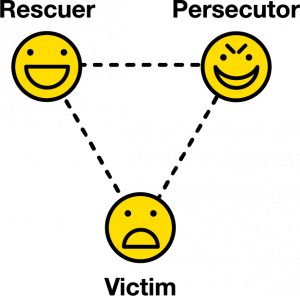The Drama Triangle – How to Spot Dysfunctional Behaviour.
The Drama Triangle is a psychological model generally used to describe dysfunctional relationships when people move through the roles of ‘victim’, ‘rescuer’ and ‘persecutor’ creating an emotional storm or drama.

More generally, turn on a television, read a newsfeed or listen to a colleague, friend or family member who always seems to be complaining about the same thing, and you will soon see the Drama Triangle in action.
These dramatic relationships or roles are the foundational structures of storytelling and teaching, and it has been argued that human beings are programmed by story. However, the Drama Triangle is also one of the unfortunate side-effects of this impressive human capacity – our passion for story, can also lead to unnecessary and destructive conflict.
Drama occurs when you move along the triangle, changing from one of these roles to another. It is the emotional energy released during these switches of role, which explains the reason behind the triangle – using drama as a substitute for healthier forms of emotional stimulation and connection. Although, these patterns play out in our work, family, social relationships and institutions – it is the ongoing drama we play out within our own minds – endlessly repeating certain painful narratives to ourselves, where most of the action really takes place.
One confusing aspect of the Drama Triangle model is the notion of a persecutor role. Although I have met many people who describe other people as persecutors, I have rarely met anyone who has described themselves in this way. A term which I find useful is ‘persecuting from a victim perspective’: other people may judge that someone is a persecutor, but from their own perspective, they are standing up for themselves as they feel victimized. I believe that everyone plays each of the three roles, although in different proportions.
Our roles on the triangle are usually ‘created’ by observing unhealthy family dynamics. Poor parenting can be modelled (copied), rebelled against or appeased. This will set patterns in later life, where our behaviour is anchored in these childhood relationships so we may feel like a victim, and either fight or flee – copy or comply. This will set patterns for future behaviour, long after a parent’s real power to control us has long passed.
One role in the drama triangle that often seems positive, is that of rescuer. At a basic level, saving someone from a dangerous situation is indeed a positive thing. However, in many families, rescuing often pours petrol on the flames of a simple conflict that can then escalate hugely. The rescuer also has a pernicious potential message, “I will rescue you as you are not capable of doing so yourself.” This is unempowering and toxic – people with good intentions need to be aware of the potential quicksand of rescuing.
Lastly, if this all seems too negative, there is also a positive version, call the ‘Winner’s Triangle’ where the words are replaced: victim to vulnerable; persecutor to potent and rescuer to resourceful. I hope this also can act as a remedy, in case the fear of being part of a Drama Triangle, renders one as powerless. The key for me, is to spot the difference between helping people grow and develop, rather than continuing an unhealthy dynamic that keeps people stuck.
I teach this and other models which originate from Transactional Analysis (TA) in my advanced coaching and change your life in 3 days courses which run twice a year. These courses feature another model from TA called Life Scripts, playing a role in life we unconsciously created during childhood that we erroneously believe will fulfil our needs and purpose. Being able to transform this script into something you would consciously choose now.
Did you like this post?
Then check out our events and courses
Sign up to our e-learning
Where to find us
For posts, events and more, follow NLP School on:
Where to find Robbie
LinkedIn: Robbie Steinhouse








